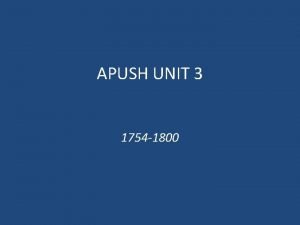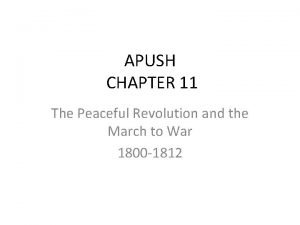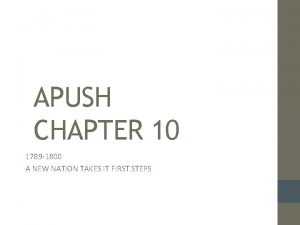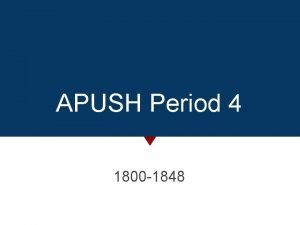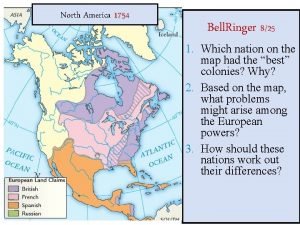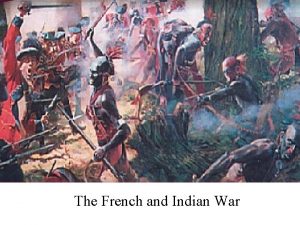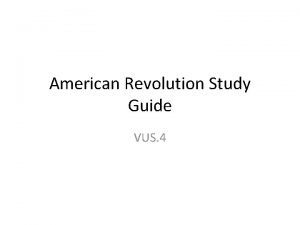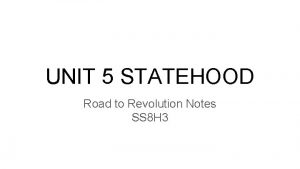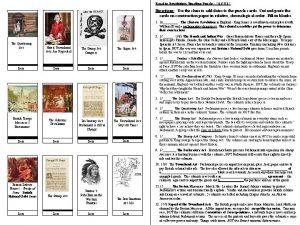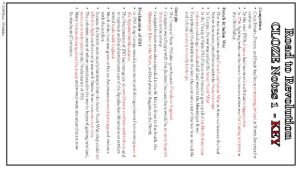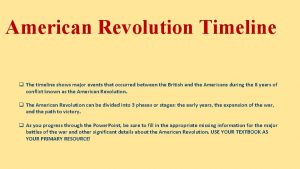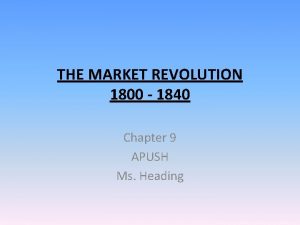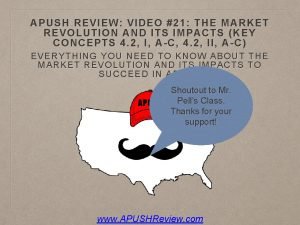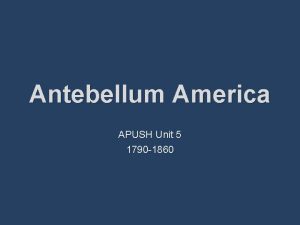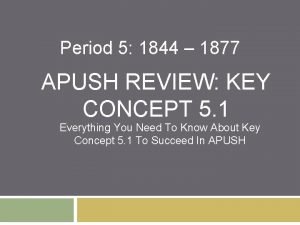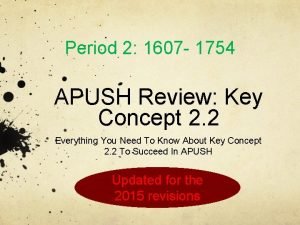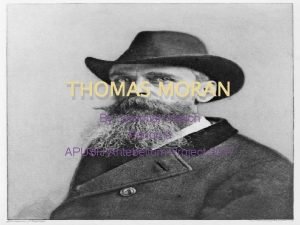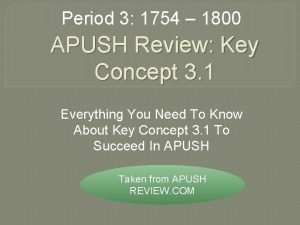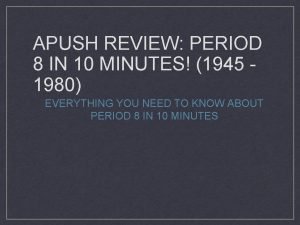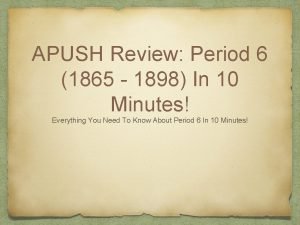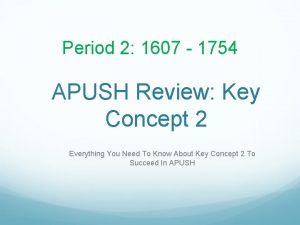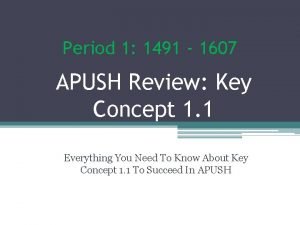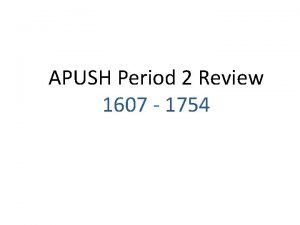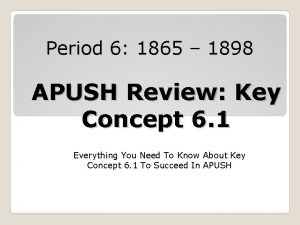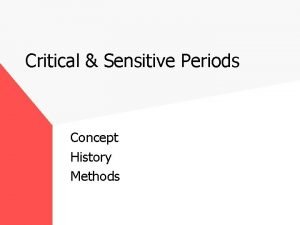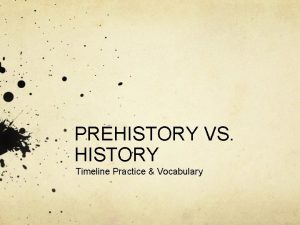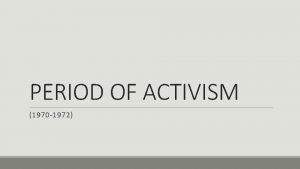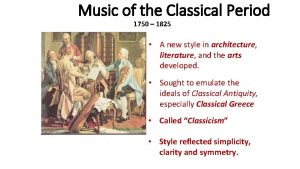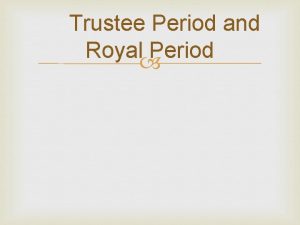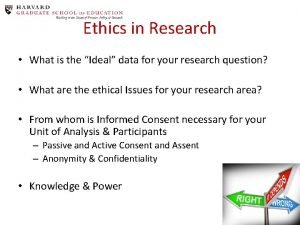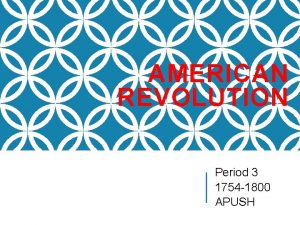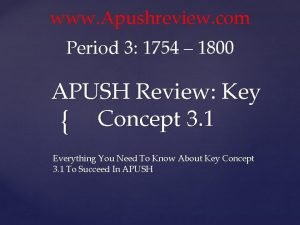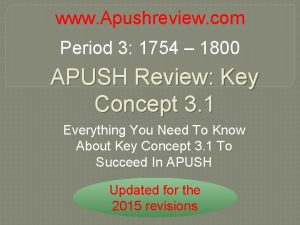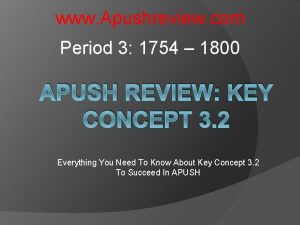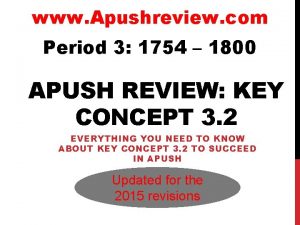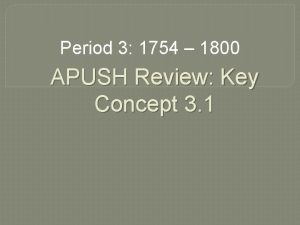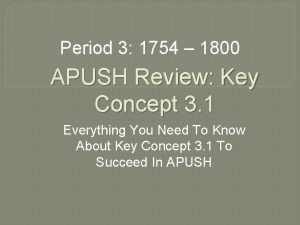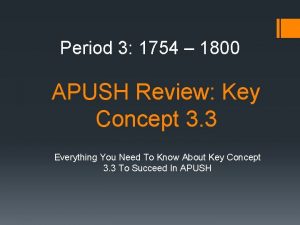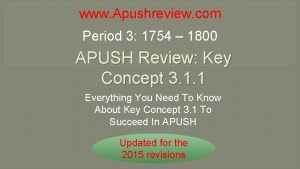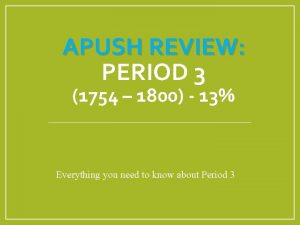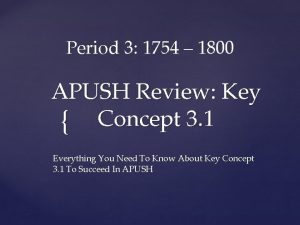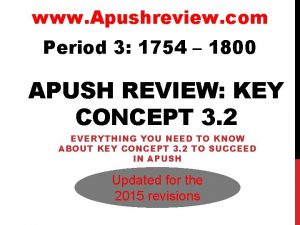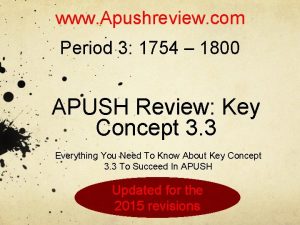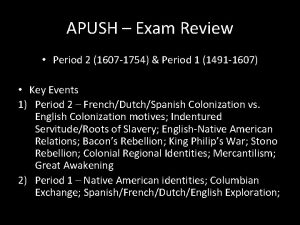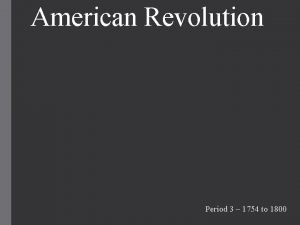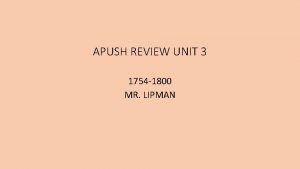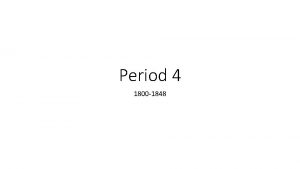APUSH Period 3 1754 1800 Road to Revolution













































- Slides: 45

APUSH Period 3 1754 -1800

Road to Revolution

The Ratification Debate

The Debate • Federalist Papers: –Written by Federalists Hamilton, Madison, and Jay –Essays explaining and supporting ratification –Published first in leading newspapers, later in book form • Similar to the writers of The Federalist, some wrote urging rejection of the Constitution: – Letters From the Federal Farmer (Lee and Smith) – Observations on the New Constitution (Warren) – “Objections to This Constitution of Government” (Mason)

Federalist #84 …I go further, and affirm that bills of rights, in the sense and to the extent in which they are contended for, are not only unnecessary in the proposed Constitution, but would even be dangerous. They would contain various exceptions to powers not granted; and, on this very account, would afford a colorable pretext to claim more than were granted. For why declare that things shall not be done which there is no power to do? Why, for instance, should it be said that the liberty of the press shall not be restrained, when no power is given by which restrictions may be imposed?

Objections to this Constitution of Government There is no Declaration of Rights, and the laws of the general government being paramount to the laws and constitutions of the several States, the Declarations of Rights in the separate States are no security. Nor are the people secured even in the enjoyment of the benefits of the common law… This government will set out a moderate aristocracy: it is at present impossible to foresee whether it will, in its operation, produce a monarchy, or a corrupt, tyrannical aristocracy; it will most probably vibrate some years between the two, and then terminate in the one or the other… George Mason


Virginia • • Crucial to the legitimacy of the new government Henry and Mason led the Anti-Federalists Washington and Madison led the Federalists won after proposing 20 amendments that the legislature would consider after ratification

New York • Anti-Federalists believed NY too large to cede authority to a central government • Hamilton’s influence and The Federalist swayed some Anti-Federalists’ opinion • Virginia’s ratification tipped the balance in NY • NC and RI ratified later

Bill of Rights

The Bill of Rights I – RAPPS (Religion, Assembly, Press, Petition, Speech) II – right to bear arms III – no quartering troops during peacetime IV – no unlawful search and seizure V – rights of accused persons VI – right to an attorney and trial by jury VII – civil suits over $20 get jury trial VIII – no cruel and unusual punishment or excessive bail IX – citizens have more rights than are listed here X – reserved rights of the states

Tenth Amendment The powers not delegated to the United States by the Constitution, nor prohibited by it to the states, are reserved to the states respectively, or to the people.

Washington’s Administration


America in the 1790 s ● Population nearly 4 million ○ doubling every 25 years ○ 90% of Americans lived on farms ○ Public debt large ($52 million) – revenue low, worthless paper $ ○ Threats from GB and Spain threatened fragile unity of US

Washington’s Presidency Election ○ Unanimously elected President by Electoral College in 1789 ○ Took oath of office on April 30, 1789 in temporary capital of NYC. ○ John Adams had 2 nd most votes and elected VP.

The Cabinet ○ ○ ○ Constitution does not provide for this. Only 3 department positions created with appointments Cabinet shaped by ideological feud between Jefferson & Hamilton ■ ■ State – Thomas Jefferson Treasury – A. Hamilton War – Henry Knox Attorney General – Edmund Jennings Randolph (after passage of Judiciary Act of 1789)

Hamilton vs. Jefferson ● Strong national government ● Weak national government ● Rich, well educated should rule ● Faith in the common people, especially farmers ● Raise voting qualifications ● Lower voting qualifications ● Loose interpretation of Constitution ● Balanced economy ● Strict interpretation of the Constitution ● Economy based on agriculture ● Pay off the national debt

Judiciary Act 1789 ●Organized the Supreme Court with a Chief Justice (John Jay) and five associates. ●Organized federal district and circuit courts. ●Established the office of the Attorney General.

Hamilton’s Financial Plan 1. Report on Public Credit (1790) a. Plan to shape fiscal policies of admin to favor wealthier groups. b. In return wealthy would loan money to gov’t c. Prosperity would trickle down to the masses 2. Report on Manufactures (1791) a. Advocated promotion of factory system b. Basis of his tariff plan to protect American manufacturers

Hamilton’s Plan (“BE FAT”) Bank ○ Components ■ Treasury would place surplus revenue here ■ Gov’t would be major stockholder, but bank would be private institution ■ Government would print paper money to provide a stable national currency

Opposition to the Bank Jefferson and Madison felt states’ rights would be jeopardized by huge central bank. ■ Moneyed interests would take precedence over farmers ■ State banks would not be able to compete. ● “Strict Constructionism” – Bank NOT within power of Congress to create Hamilton’s Counter Argument ○ “Loose Constructionism” – powers not delegated to the national gov’t in Constitution are not prohibited by virtue of necessary and proper (elastic) clause. Concept of “implied powers. ” Washington signed bank measure into law Feb. 1791

Hamilton’s Plan Continued Excise Taxes ● In 1791 – Congress passed a $. 07/gal tax on whiskey ● Backcountry distillers most affected ● Poor roads hurt profits ● Whiskey often used as currency because so much Funding at Par ● Bonds had depreciated 10 -15 cents ● Plan to pay back gov’t debt to bondholders at face value plus interest ● Purpose to bolster national credit

Hamilton’s Plan Continued Assumption of State Debts ● Motive: make the states obligated to the federal government ● Hamilton thought the national debt was a blessing ● States with large debts favored (MA); states with little to no debt did not (VA) - Became a north v. south issue ● Compromise: north got assumption of debts while south got national capital moved to District of Columbia Tariffs ● Revenue Act of 1789 - 8% tariff on imports ● Source of revenue but also aimed at protecting new US

Whiskey Rebellion ● Southwest Pennsylvania backcountry hit hard by excise tax ● “Whiskey Boys” torched bldgs, tarred and feathered tax collectors, talked of “secession” ● Washington summoned militia of several states (13, 000) – escorted by Washington and Hamilton themselves ● Significance: First display of fed’l gov’t “ensuring domestic tranquility” ● Jeffersonians condemned action as a “brutal display of force” and gained more followers.

Amerindians in Old Northwest ●Iroquois forced onto reservations ●Chief Little Turtle led the Western Confederacy in opposition to westward expansion ●Battle of Fallen Timbers (1794) - Forced to abandon British allies ●Treaty of Greenville (1795) - Cleared ⅔ of Ohio & Indiana of tribes ●Eastern Woodlands tribes forced west

Political Parties

Birth of Two-Party System ● Founding Fathers feared of “factions” as going against spirit of national unity. ● Madison’s Federalist #10 advised that factions cannot be prevented but they could be controlled ○ Frequent elections and separation of powers ○ Majority rule, but minority rights

FEDERALISTS ● NOT the same as the “federalists” who supported the Constitution in 1780 s - although some views in common ● Believed in gov’t run by the elite ■ Rich had more time to study problems of governing ● Distrusted the common people ■ Feared rule by “mobocracy” ■ Believed democracy too important to be left to the people. ● Fed’l gov’t should encourage business, not interfere with it. ■ Dominated by merchants, manufacturers and shippers ■ Most lived on eastern seaboard where commerce flourished. ● Pro-British in Foreign Policy ■ Trade with Great Britain was key to Hamilton’s plan

DEMOCRATIC REPUBLICANS ● Advocated for rule of the people ● Should be literate, but believed that “masses” could be taught ● Appealed to middle-class (farmers, laborers, artisans, small shopkeepers) - Strong in South & Southwest ● Government that governed best, governed least ■ Bulk of power should be retained by states. ■ Limit federal power through strict interpretation of Constitution. ■ National debt was a curse that should be paid off ASAP ● Believed in freedom of speech ● Basically pro-French

Foreign Policy

First Test: French Revolution ● French declared themselves a “republic” and originally Americans supported them, but violence changed public opinion ● Jeffersonians still support France ● Hamiltonians want to stay neutral ● US still obligated under Franco-American Alliance of 1778

Washington’s Neutrality Proclamation (1793) ● US would be neutral ● Warned US citizens to be impartial to both sides. ○ Jefferson furious – Washington did not consult Congress ○ Hamilton supported it. ● Citizen Genet ○ French diplomat in US who felt Neutrality Proclamation not a true reflection of US feelings towards France ○ Went to people directly to ask for money and supplies for war cause ○ George Washington booted him out of country.

Second Test: Problems with ●Great Britain was a thorn in US side Britain ○constantly harassing US frontier settlers ○Seized 300 US ships and impressed (stole) US sailors. ○Remained in posts in violation of 1783 peace treaty ○Sold firearms and alcohol to Natives who attacked US settlers. ●Federalists did NOT want war (75% of import duties from British trade) ●Jeffersonians wanted embargo

Jay’s Treaty ● Washington sent Jay to negotiate a treaty in 1794 ○ Provisions ■ GB renewed pledge to leave posts ■ GB would pay for recent seizures of ships, sailors ■ GB did not guarantee they would not do it in the future though ■ AND US forced to pay PRE-Revolution debts owed to GB Jeffersonian outrage resulted in creation of Democratic Republican Party

Pinckney Treaty Spain worried about Anglo-American alliance – ready to give up some rights in North America ■ ■ Granted US rights to navigate Mississippi and port of New Orleans Yielded large tract of land north of Florida (north of 31 st parallel)

Washington’s Farewell Address Historical Context ○ Exhausted physically and tired of verbal abuse from Jefferson for becoming partisan Letter to the People ○ Warned of evils of political parties ○ Warned of entangling alliances (like treaty with France) ○ Isolationism became dominant foreign policy for next 100 yrs.

Washington’s Precedents ●Cabinet of advisors that were regularly consulted ●Right to choose cabinet ●Two Term Maximum ●Outside appointment of a Chief Justice to the Supreme Court

Adam’s Presidency

John Adams’ Presidency ● Election ○ 1796 - Defeats Thomas Jefferson 71 -66 in Electoral College ○ Jefferson becomes VP ● Foreign Flare-Ups ○ France ■ Saw Jay’s Treaty as a violation of 1778 Franco -American Treaty ■ Seized 300 merchant vessels by mid-1797 ■ Refused to receive America’s new envoy

XYZ Affair ● John Adams sent delegation to France to work it out ● Approached by 3 French agents (“X, Y and Z”) who demanded loan and bribe of 250, 000 to talk to French foreign minister Talleyrand. ● “Millions for defense, but not one cent for tribute (bribes)” ● Negotiations broke down ■ Undeclared “Quasi War” with France 1798 -1800 ● Navy Department created - US expanded its 3 ship Navy ● US Marine Corps established ● Embargo with France imposed (no trade)

Convention of 1800 ○ ○ John Adams sent new envoy to France in 1800 Napoleon accepted – more bent on European conquest, not war with US Improved Relations made Louisiana Purchase possible 3 years later. 22 year alliance between US and France dissolved.

Alien and Sedition Acts (1798) Oppressive laws designed to reduce power of Jeffersonians and silence anti-war opposition a. Alien Act b. i. iii. Attack on pro-Jeffersonian “aliens” Raised residency requirements for US citizenship from 5 yrs to 14 yrs. President could deport “dangerous” foreigners. i. Anyone who impeded policies of the gov’t or falsely criticized its officials would get heavy fine and imprisonment. Direct violation of 1 st Amendment Expired day before Adams left office. Sedition Act ii. iii.

Virginia and Kentucky Resolutions (1798) ● Democratic Republicans felt Alien and Sedition Acts were unconstitutional ● Jefferson and Madison secretly penned two resolutions that asserted that states have the right to nullify unconstitutional laws passed by Congress. ● Federalists retorted that the people, not states created Constitution and that the Supreme Court and not states determined the constitutionality of laws. ● Nullification - belief that the states were the final judges of whether a federal law was constitutional ● No other states but VA and KY adopted resolutions, but southern states would use this later in 19 th century to support nullification and secession.

Revolution of 1800 ●Rematch Adams (President) vs. Jefferson (Vice President) ●Jefferson and Burr tie for electoral votes ●Significance: Peaceful and orderly transfer of power
 1754 to 1800 apush
1754 to 1800 apush Peaceful coexistence apush
Peaceful coexistence apush Convention of 1800 apush
Convention of 1800 apush 1800 apush significance
1800 apush significance 1754 lulu love
1754 lulu love North america 1754 map worksheet answer key
North america 1754 map worksheet answer key French territory in north america 1754
French territory in north america 1754 What is paved and unpaved road
What is paved and unpaved road American revolution study guide answer key
American revolution study guide answer key American revolution cloze notes
American revolution cloze notes Road to revolution timeline answers
Road to revolution timeline answers American revolution cloze notes
American revolution cloze notes Road to american revolution timeline
Road to american revolution timeline Russian revolution vs french revolution
Russian revolution vs french revolution Third agricultural revolution definition
Third agricultural revolution definition You should hope that this game will be over soon
You should hope that this game will be over soon Market revolution apush
Market revolution apush Market revolution apush
Market revolution apush Period of revolution formula
Period of revolution formula Apush period 4 jeopardy
Apush period 4 jeopardy Detente apush
Detente apush Antebellum period apush
Antebellum period apush Compromise of 1877 apush
Compromise of 1877 apush Reaganomics apush
Reaganomics apush Apush key concepts period 2
Apush key concepts period 2 Jeremiah welch
Jeremiah welch Period 3 apush key concepts
Period 3 apush key concepts Sunbelt apush
Sunbelt apush Period 2 apush review
Period 2 apush review Apush review period 6
Apush review period 6 Apush key concepts period 2
Apush key concepts period 2 Apush key concepts period 1
Apush key concepts period 1 Period 2 apush
Period 2 apush Period 6 apush key concepts
Period 6 apush key concepts The development of children 7th edition
The development of children 7th edition Critical period
Critical period Ad vs bce
Ad vs bce In this period, the youth became completely rebellious.
In this period, the youth became completely rebellious. Refractory period
Refractory period Critical period vs sensitive period
Critical period vs sensitive period Stability period vs measurement period
Stability period vs measurement period When is the relative refractory period
When is the relative refractory period The classical period started from 1750 to 1872
The classical period started from 1750 to 1872 Trustee period and royal period
Trustee period and royal period Critical period vs sensitive period
Critical period vs sensitive period 12 neutrons; metal; 11 electrons
12 neutrons; metal; 11 electrons
